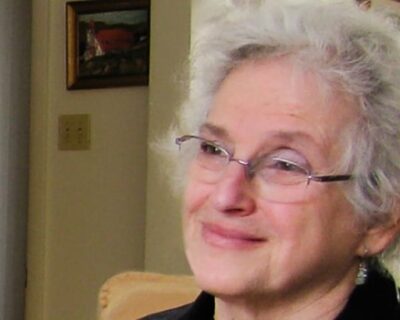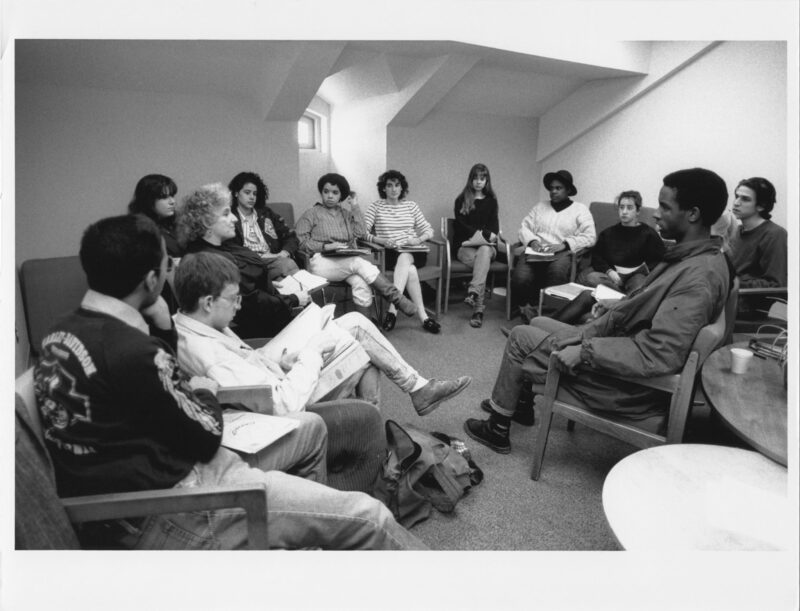Founder of New School reflects on 50th
In August 1973, the founders of the New School gathered to prepare for the arrival of 180 students in our alternative pre-university arts program. We comprised 15 full-time and part-time teachers, a librarian, an office manager, an admissions officer, two community animators, a director and a community facilitator. The school occupied two charming elderly mansions on the mountain.
The school’s philosophy of Humanistic Education was based on the writings of Abraham Maslow and Carl Rogers and others who proposed a holistic student-centered education which simultaneously addressed learners’ cognitive and affective needs. Together, teachers and students would develop courses based on the students’ articulation of their interests and motivations as learners. Learning groups would form through negotiation among members about why, what and how they wanted to learn and be evaluated.

Photo: Greta Hofmann Nemiroff
All students and faculty members also belonged to Bands, primary affiliative groups (of 15-20 students) which would meet twice weekly to address the lives of their members and to sculpt themselves into viable functioning groups. It was everyone’s responsibility to contribute to the school community and to participate in decision making. From our beginning, there was always interest in bettering our world through social change; numerous activist projects within the college and larger community were initiated and/or joined by New Schoolers.
The school has always been a locus of intense creativity, originality, enthusiasm, activism, and solidarity. However, it must also be said that over time and, as a result of worsening general conditions in the college sector, the New School has experienced regular cuts in curriculum. staffing, facilities, and student quotas.
While in 1973 we offered Art, Art History, Anthropology, English, French, History, Humanities, Philosophy, Sociology, Political Science, Music, Theatre, and Ceramics, by 2024 we have been reduced to offering courses only in English and Humanities.
Early New School students were full time in pre-university Arts at the New School. Very few students in our first years had full time jobs, so they had time to hang out, to form friendships, to converse at length with each other, the faculty, and staff. Now that the New School offers only English and Humanities, students from all programs can take these courses at the New School. While we benefit from the presence of a more heterogeneous population, both students and shared faculty are limited in the time they can devote to being fully present in the school’s activities.
Over the years, we have had to change and adjust to a changing world. One of the biggest changes is that over the past half century, students and faculty have run out of free time. Students hurry between courses and jobs; faculty have a much heavier teaching and marking load than they had before the strike of 1982-‘83.
Having the luxury of time to reflect, to discuss things outside of class, to bring together diverse ideas and experiences are key to learning and growing. The loss of this flexibility has changed our educational experience. The presence of computers and social media have also altered the way people communicate and relate to one another and to groups. Although these social changes present a challenge to the philosophical roots and pedagogy of New School education, New School students still thrive.
I celebrate that the New School’s basic purpose and values have endured. Students still pursue their intellectual interests; the dialogic nature of the classes encourages them to find their voices and speak up in this world, and there is a sense of community in our space. There are still talented and interested faculty members happy to work here.
It must also be thankfully acknowledged that we have been able to “keep the faith” with a lot of help from our friends and colleagues. I salute those members of the college administration who have encouraged and helped us, interested colleagues from other departments, all the wonderful support staff, and the devoted teachers, trainees, and students at the New School. Fifty years in, let’s celebrate the skills, energy, and conviction that Andrew Katz, Cory Legassic and Mari Heywood currently bring to the school. It is the combined energy and generosity of all these people that have made this joyous anniversary possible as we embark on our next fifty years. We invite our friends at Dawson to join our celebration on Saturday, April 13, from 4 to 6 pm in 5B.16 (the Multi-Purpose Room) on the fifth floor.
-By Greta Hofmann Nemiroff
Dawson invited Greta Hofmann Nemiroff, a living legend in innovative education and women’s studies in Canada as well as a beloved retiree of Dawson, to write a personal reflection on the occasion of New School’s 50th anniversary. Greta was a founding member of Dawson’s New School in 1973 and served as its director from 1975-2015. She is also the author of a book about the New School: Reconstructing Education: Toward a Pedagogy of Critical Humanism. Toronto: OISE Press, 1992.



